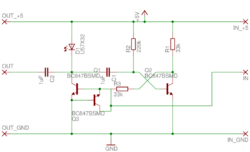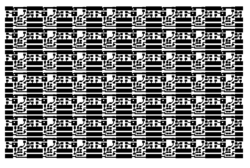CCCamp2007/Blitzenlights: Unterschied zwischen den Versionen
Rawphi (Diskussion | Beiträge) (Die Seite wurde neu angelegt: = About = Blitzenlights is a project created for the camp decoration of the chaos communication camp 2007. The goal is to build a chain of sequentially flashing LED's,...) |
K (verschob „Blitzenlights“ nach „CCCamp2007/Blitzenlights“) |
||
| (4 dazwischenliegende Versionen von 2 Benutzern werden nicht angezeigt) | |||
| Zeile 1: | Zeile 1: | ||
| − | = About = | + | == About == |
| − | Blitzenlights is a project created for the camp decoration of the | + | ''Blitzenlights'' is a [[Projekte|project]] created for the camp decoration of the [[CCCamp2007|Chaos Communication Camp 2007]]. The goal was to build a chain of sequentially flashing LEDs, creating a kind of "running light pulse" feeling. The circuit is more or less completely analog. |
| + | == The Big Picture == | ||
| − | + | The system consists of small modules with one LED each, which are connected by a 3-wire cable. The total length of one ''Blitzenlight'' chain can be almost any length, in our setup we chose to put them every 0.75m resulting in a total length of about 30-50m. | |
| − | The | + | == The Small Picture == |
| + | [[Bild:Blitzenlights-schematic.png|thumb|right|250px|schematic of the module]] | ||
| − | + | Each module has 2 connection ports: an incoming, with 2 power lines and a trigger signal, and an outgoing one with eaxctly the same signals. The circuit itself is a standard monoflop built with 2 transistors. Additionally, we couple the trigger signal into the base of the pulse-active transistor, thus triggering the monoflop with a positive edge. When the monoflop falls back into its stable state, it raises the voltage at the outgoing capacitor, which will trigger the next module down the road. Simple as that. | |
| − | Each module has 2 connection ports: an incoming, with 2 power lines and a trigger signal, and an outgoing one with | ||
| − | [[Bild: | + | [[Bild:Europlatine.png|thumb|right|250px|pcb layout, 56 modules]] |
| − | = The Setup = | + | === The Setup === |
(well, still need to load up pictures :) | (well, still need to load up pictures :) | ||
| + | |||
| + | * Isis' [http://www.flickr.com/search/?q=smd%20metalab&w=10578645%40N03 "Making of"] @ Flickr | ||
| + | |||
| + | [[Kategorie:WhateverLab]] | ||
| + | [[Kategorie:Projekte]] | ||
| + | [[Kategorie:CCCamp2007]] | ||
| + | [[Kategorie:English]] | ||
Version vom 11. Mai 2012, 01:32 Uhr
About
Blitzenlights is a project created for the camp decoration of the Chaos Communication Camp 2007. The goal was to build a chain of sequentially flashing LEDs, creating a kind of "running light pulse" feeling. The circuit is more or less completely analog.
The Big Picture
The system consists of small modules with one LED each, which are connected by a 3-wire cable. The total length of one Blitzenlight chain can be almost any length, in our setup we chose to put them every 0.75m resulting in a total length of about 30-50m.
The Small Picture
Each module has 2 connection ports: an incoming, with 2 power lines and a trigger signal, and an outgoing one with eaxctly the same signals. The circuit itself is a standard monoflop built with 2 transistors. Additionally, we couple the trigger signal into the base of the pulse-active transistor, thus triggering the monoflop with a positive edge. When the monoflop falls back into its stable state, it raises the voltage at the outgoing capacitor, which will trigger the next module down the road. Simple as that.
The Setup
(well, still need to load up pictures :)
- Isis' "Making of" @ Flickr

